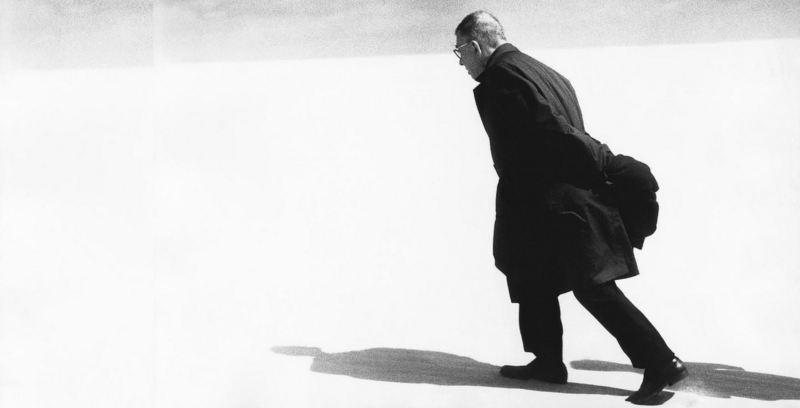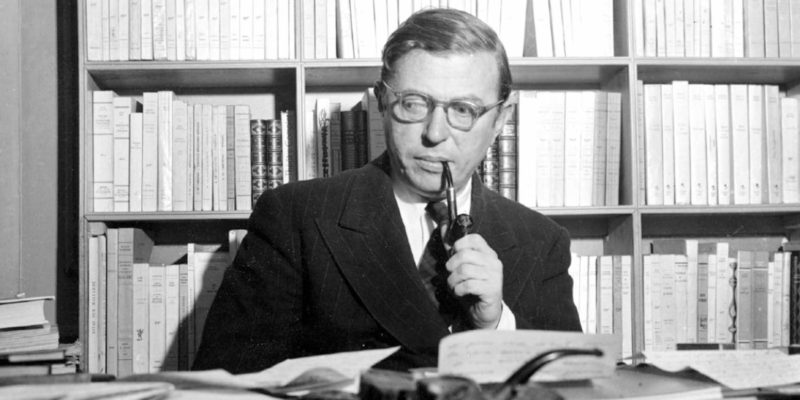Table of Contents
We explain what existentialism is, its foremost exponents and writers. In addition, its main characteristics and impact on art.

What is existentialism?
Existentialism is a 20th century school of thought that encompasses a wide range of contemporary thinkers including Jean-Paul Sartre, Karl Jaspers, Martin Heidegger and Gabriel Marcel. Despite their profound differences, all of them seek to understand the issue of human existence, which makes up the essence of man in his own singularity. It thus follows that existence precedes essence, not the other way around, which is one of the most famous tenets of existentialism.
The foundations of existentialism can be traced back to Kierkegaard - regarded as the father of the movement - and his works on anguish, and to a lesser extent to Nietzsche's break with traditional metaphysics. Since its origin, existentialism has significantly influenced many disciplines, as is the case of literature with authors like Albert Camus, Emil Cioran, Miguel de Unamuno, Thomas Mann and Franz Kafka, among others.
- See also: Aristotelian Thought
Origin and history of existentialism
Most philosophers consider Søren Kierkegaard (1813-1855) to be the first existentialist philosopher. While it is true that the first to use the term was Jean-Paul Sartre, it was Kierkegaard who opposed Hegelian idealism and built upon various elements taken up by the existentialist thought, such as anguish and loneliness. In addition, there are common points with Schopenhauer's pessimism (1788-1860) and certain novels by Fyodor Dostoevsky (1821-1881).
Strictly speaking, however, existentialism as a school of thought originated in the 20th century. After World War I and halfway through World War II, Europe was in the throes of a profound ethical and religious crisis. The violence and death experienced at the beginning of the century left society in a state of skepticism and mistrust regarding the dominant values prevalent until then. Out of this discontent and as a reaction to prevailing philosophical traditions emerged existentialism, understood as a set of theoretical works that sought to popularize and get at the meaning of freedom, nothingness, responsibility and absurdity.
After World War II, existentialism became a very important philosophical and cultural movement. The works of Sartre and Albert Camus as well as those of Gabriel Marcel became bestsellers, as did Martin Heidegger's Being and Time outside Germany. Books such as Sartre's Nausea, The Wall and Being and Nothingness, and Camus' The Stranger and The Plague circulated around most of the Western world.
Sartre's lecture "Existentialism is a Humanism" was a turning point in the philosophical and cultural history of Europe: Jean-Paul Sartre, the father and foremost exponent of the existentialist movement, defined and defended existentialist ideas at a public lecture at the Maintenant club.
Beyond Sartre, important works from the same period are those of Simone de Beauvoir, as well as those of Camus (who rejected the label of "existentialist"). The Second Sex by Beauvoir is a monumental work that integrates existentialist issues with concerns belonging to other forms of thought, such as the feminist struggle and the role of women. Also worthy of mention is the work of Maurice Merleau-Ponty, phenomenologist and for a brief period friend of Sartre. His best-known book, which lies within existential phenomenology, is Phenomenology of Perception.
Existentialist concepts
Existence precedes essence
The idea that existence precedes essence is a central claim of existentialism. In his lecture "Existentialism is a Humanism”, Jean-Paul Sartre explains this idea by making an analogy with a paper-knife. While an artisan makes a paper-knife with a purpose in mind, therefore knowing that its essence precedes its being, human existence originates differently.
Sartre holds that if there were a God-creator, he would conceive in his divine mind the essence of man before he existed, just as it happens with the artisan and the paper-knife. However, by stating that God does not exist, it necessarily follows that man is the one being in whom existence precedes essence, as he exists before being defined by any concept.
Sartre argues that man first of all exists, surges up in the world, and then defines himself. Man first exists as “nothing” and only by being, a posteriori, does he construct himself as a project whose essence he must define for himself. For atheistic existentialism, there is no human nature because there is no God to define it.
Choice, freedom, responsibility

As free beings, an individual is responsible for their actions. For existentialism, subjectivity implies a deep sense of choice. In choosing himself, the human being chooses all of mankind. As a “being” and “existing” project (“being-in-the-world”, that is, as someone already engaged and involved in the world), man defines himself with each of his decisions. With every decision he makes, he is choosing what he believes men should be. Thus, when one chooses, when one opts for a way of conducting oneself towards others; one is choosing how one believes all humans should behave.
Thus, choice is one of the central ideas of existentialist thought. Being entirely free to choose oneself implies being entirely responsible for all men. Each decision entails such a degree of responsibility that, as Sartre explains, freedom and responsibility are followed and accompanied by the weight of anguish. Anguish, however, should not be understood in the pessimistic sense, but rather as an understanding of the gravity and responsibility involved in making decisions.
Whoever embraces an existentialist way of life, whoever chooses authentically and responsibly, ought to, every time they make a decision, ask themselves what would happen if everyone else did the same? It is not, then, anguish that leads to inaction but the despair experienced by anyone who faces the daily dilemma of having to decide for one way of acting or another.
Existentialist schools

It is difficult to exactly identify which writers or thinkers belong to existentialism in the strict sense. Two main existentialist schools of thought existed according to their views on the idea of God: atheistic and Christian existentialism. Nevertheless, various contemporary authors claim that there was a third existentialist school: agnostic existentialism, represented by Albert Camus.
- Atheistic existentialism. It proposes the non-existence of God and uses this affirmation as the basis for the idea that existence precedes essence. Jean-Paul Sartre is its most notable exponent.
- Christian existentialism. It proposes that God exists, based on the ideas postulated by Kierkegaard. Its leading figures are Gabriel Marcel, Miguel de Unamuno and Karl Jaspers.
- Agnostic existentialism. It proposes that the existence or non-existence of God is irrelevant to the development of existentialism. Albert Camus is one of its best-known figures.
Exponents and writers of existentialism
Among the foremost exponents of existentialism are:
- Jean-Paul Sartre (1905-1980). French philosopher, writer and novelist. He declined the Nobel Prize in Literature in 1964, opposing institutions that sought to mediate between man and culture. His major works are Being and Nothingness, Nausea and The Plague, among others.
- Karl Jaspers (1883-1969). German psychiatrist and philosopher, he was a major figure in German reconstruction. In Philosophy he gives a personal account of the history of philosophy. The work that comes closest to a systematic philosophy is Of Truth. Also notable is Philosophy and Existence.
- Martin Heidegger (1889-1976). German philosopher, he is one of the most important thinkers of the 20th century and of the history of Western philosophy. His work Being and Time set a precedent and an inescapable turning point in the history of philosophy with a profound influence that continues to this day.
- Gabriel Marcel (1889-1973). French playwright and philosopher. His thought was regarded as Christian existentialism or personalism. Among his works are Being and Having, Metaphysical Diary and From Refusal to Invocation.
- Simone de Beauvoir (1908-1986). French philosopher, teacher and writer. She was a feminist activist who wrote novels and essays on feminism, existentialism and various political, social and philosophical problems. Her best known-work is The Second Sex.
- Albert Camus (1913-1960). French novelist, playwright, essayist, philosopher and journalist. Though he was considered to be close to existentialism, his thought actually lies within absurdism, as can be seen in many of his works such as The Rebel, The Myth of Sisyphus, The Stranger, Caligula and The Plague.
Impact of existentialism on art
While existentialism emerged as a philosophical movement in the late 19th and early 20th centuries, it was always closely linked to art and literature. Both Nausea by Jean-Paul Sartre and the works of Albert Camus are clear examples of this, among other existentialist novels and plays by other writers and playwrights.
Both the novels of Franz Kafka and Fyodor Dostoyevsky are considered to lie within existentialism, even when they preceded the movement. The work of Miguel de Unamuno is also considered existentialist. Other existentialist writers are Hermann Hesse, Thomas Mann, Stanislaw Lem and Emil Cioran. Ingmar Bergman's films, such as The Seventh Seal or Fanny and Alexander are also regarded as existentialist artistic works. The same applies to Solaris, by Andrei Tarkovsky and Mirror or The Sacrifice, by the same director.
Related articles:
Was this information useful to you?
Yes NoThank you for visiting us :)